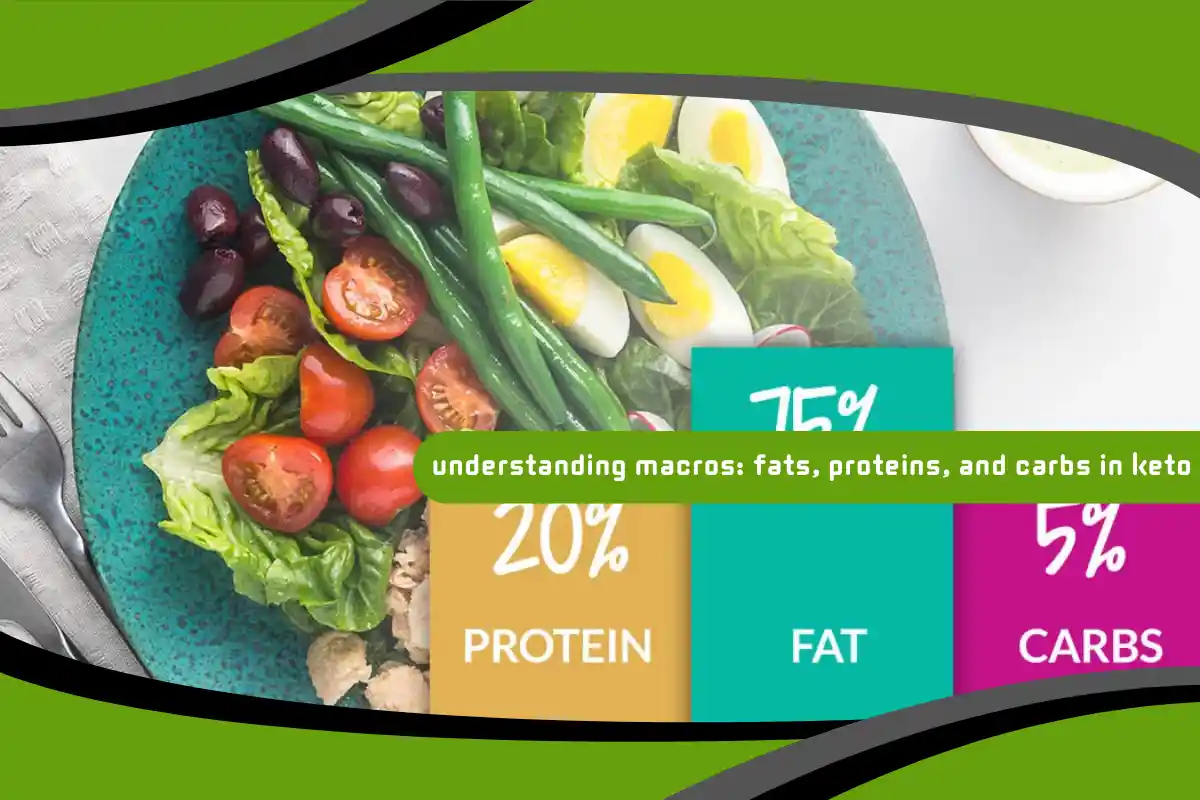When starting a keto diet, understanding the role of macronutrients—fats, proteins, and carbohydrates—is essential for achieving success. Unlike traditional diets, keto focuses on drastically reducing carbohydrate intake while increasing fat consumption to promote fat-burning and ketone production. This shift requires a solid grasp of each macronutrient’s function and its contribution to your overall health. In this article, we’ll delve into the essential roles fats, proteins, and carbs play in the keto diet, explaining their benefits, how to balance them, and how to optimize your macros for the best results.

What Are Macronutrients and Why Are They Important?
Macronutrients, or macros, are the nutrients our bodies need in large amounts to function properly. They provide energy, support cell growth, repair tissues, and maintain bodily functions. The three primary macronutrients are fats, proteins, and carbohydrates, each with a specific function. On the keto diet, understanding how to manipulate your intake of these nutrients is key to entering and maintaining a state of ketosis, where your body burns fat instead of carbs for energy.
The Role of Fats in the Keto Diet
Fats are the cornerstone of the keto diet, making up about 70-75% of your daily caloric intake. The focus on high fat intake helps the body transition from burning carbohydrates for energy to burning stored fat. Healthy fats, such as avocados, nuts, and olive oil, provide essential fatty acids that support brain function, hormone production, and cellular repair. Fats also help keep you feeling full, reducing cravings and helping to regulate appetite throughout the day.
Watch also: Is the Keto Diet Safe for Everyone? Expert Analysis on Who Should and Shouldn’t Follow Keto
Why Protein Matters on Keto
While protein should make up around 20-25% of your daily calorie intake on a keto diet, it’s crucial to consume the right types of protein. Protein is essential for muscle repair and growth, and it also helps maintain a healthy immune system. However, too much protein can kick you out of ketosis, as excess protein is converted into glucose. Opt for high-quality protein sources like lean meats, fish, and eggs to provide your body with the necessary building blocks for muscle and overall health without risking gluconeogenesis, the process where excess protein is converted into sugar.
Carbohydrates and the Keto Diet: A Reduced Role
On a typical keto diet, carbohydrates are severely restricted—usually to about 5-10% of your daily caloric intake. The reason for this restriction is that carbs are the body’s primary source of energy, but on keto, the goal is to switch from using glucose (derived from carbs) to ketones, which are produced by breaking down fats. However, not all carbs are created equal. Focus on low-carb vegetables like leafy greens, cauliflower, and zucchini to get essential nutrients without disrupting ketosis.
How to Calculate Your Macro Ratios for Keto
To get the most out of your keto diet, it’s important to calculate your ideal macronutrient ratios. This varies depending on your individual goals—whether it’s weight loss, muscle gain, or overall health. A common starting point for keto macros is 70% fat, 25% protein, and 5% carbohydrates. Using a keto macro calculator can help tailor these ratios to your specific needs, ensuring that you are in the optimal range for burning fat and staying in ketosis.
The Importance of Healthy Fats on Keto
Not all fats are created equal. While the keto diet encourages a higher fat intake, it’s important to focus on consuming healthy fats. Unsaturated fats, such as those found in olive oil, nuts, seeds, and avocados, should be your go-to sources. These fats are not only great for ketosis but also support heart health and reduce inflammation. Saturated fats, found in butter, fatty meats, and cheese, should be consumed in moderation to avoid negative impacts on cardiovascular health.
How Protein Supports Muscle Maintenance
Incorporating adequate protein into your keto diet is crucial for maintaining muscle mass. During weight loss, there is a risk of losing muscle along with fat, especially if protein intake is too low. To preserve muscle, aim to consume high-quality protein at every meal. Protein-rich foods like chicken, beef, and fish provide amino acids that support muscle repair and growth, helping to prevent muscle breakdown during weight loss phases.
Carbs: The Limited Fuel Source on Keto
While carbs are a vital source of energy on most diets, their role on the keto diet is much more limited. By drastically reducing carb intake, the body is forced to rely on fats as its primary fuel source. This state of ketosis helps your body burn fat more efficiently. It’s important to focus on consuming fiber-rich, non-starchy vegetables and to avoid processed carbs, which can spike blood sugar levels and hinder your ability to stay in ketosis.
Balancing Fats, Proteins, and Carbs for Ketosis
The key to success on the keto diet is finding the right balance of fats, proteins, and carbohydrates. Too much protein can interfere with ketosis, while too few carbs may lead to fatigue and nutrient deficiencies. A well-balanced keto meal plan includes an adequate amount of fats for energy, moderate protein for muscle maintenance, and just enough carbohydrates to fuel the body without exceeding your carb limit.
Benefits of Ketosis: What Happens When You Burn Fat
When you follow the keto diet correctly, your body enters a state of ketosis, where it burns fat for fuel instead of carbohydrates. This metabolic shift offers numerous benefits, including enhanced fat loss, improved energy levels, and mental clarity. Additionally, ketosis has been shown to reduce inflammation, improve blood sugar levels, and support heart health, making it a beneficial approach for many individuals, especially those looking to manage weight or improve overall wellness.
Understanding the Role of Fiber on Keto
While the keto diet limits carbohydrates, it’s important to distinguish between fiber and other types of carbs. Fiber, which is found in vegetables, nuts, and seeds, is a type of carb that is not digested by the body and does not impact blood sugar levels. Fiber plays a crucial role in digestive health by promoting regular bowel movements and supporting gut health, making it essential to include fiber-rich foods in your keto meal plan.
How to Manage Carb Cravings on Keto
One of the most common challenges on the keto diet is managing carb cravings. Since carbs are typically the body’s preferred energy source, reducing your carb intake can initially lead to feelings of deprivation. However, by focusing on nutrient-dense, low-carb foods that are high in fiber and fat, you can satisfy your hunger and keep cravings at bay. Keto-friendly snacks like nuts, seeds, and cheese can help curb your appetite without kicking you out of ketosis.
Watch also: How to Start the Keto Diet: A Complete Step-by-Step Beginner’s Guide
The Science Behind Ketosis and Fat Burning
When you significantly reduce carbohydrate intake, your body begins to produce ketones, which are a byproduct of fat metabolism. Ketones become the primary fuel source for your body and brain, replacing glucose. This shift not only accelerates fat burning but also provides a consistent energy source, even during periods of fasting or intense physical activity. The science of ketosis is central to the keto diet’s ability to support weight loss and improve metabolic health.
The Importance of Hydration on Keto
As your body adjusts to the keto diet and shifts into ketosis, it will excrete more water and electrolytes. Proper hydration is essential to avoid dehydration and maintain optimal bodily functions. In addition to drinking plenty of water, be sure to replenish your electrolytes by consuming foods rich in potassium, magnesium, and sodium, or by taking supplements if necessary.
Managing Keto Flu: What to Expect
When transitioning to a keto diet, some people experience what is commonly known as “keto flu.” This temporary condition includes symptoms such as headaches, fatigue, and irritability, as the body adjusts to using ketones for energy instead of glucose. To minimize the effects of keto flu, make sure you are getting enough electrolytes, staying hydrated, and allowing your body time to adapt to the new fuel source.
The Role of Fats in Hormone Regulation
Fats are not just an energy source on the keto diet; they also play a vital role in hormone production and regulation. Healthy fats are necessary for the production of hormones like estrogen, testosterone, and cortisol, which are crucial for maintaining overall health. By focusing on high-quality fat sources, you can help support your body’s hormone balance, which is especially important for those who may be experiencing hormonal imbalances or other health issues.
Protein and Satiety: Keeping Hunger at Bay
Protein is not only important for muscle maintenance but also for controlling hunger. By including adequate amounts of protein in your keto meals, you can increase feelings of fullness and reduce the likelihood of overeating. Protein helps regulate blood sugar levels, ensuring that energy is released steadily throughout the day. This can prevent energy crashes and keep your appetite in check.
The Importance of Whole, Unprocessed Foods
On the keto diet, it’s important to focus on whole, unprocessed foods to get the most out of your macros. Processed foods often contain hidden sugars, unhealthy fats, and preservatives that can disrupt ketosis. By opting for fresh, whole foods like grass-fed meats, organic vegetables, and healthy fats from avocados and nuts, you can ensure that you are nourishing your body with nutrient-dense ingredients that support your keto goals.
Conclusion: Mastering Your Macros for Keto Success
Understanding macros is essential for achieving success on the keto diet. By carefully balancing fats, proteins, and carbohydrates, you can optimize your nutrition, enter ketosis, and start reaping the benefits of fat-burning. The key is to choose the right types of foods and pay attention to how your body responds. By staying informed and adjusting your macros as needed, you can unlock the full potential of the keto diet for improved health, weight loss, and overall wellness.
Watch also: What to Expect in Your First Week on Keto: A Complete Guide for Beginners



No comment